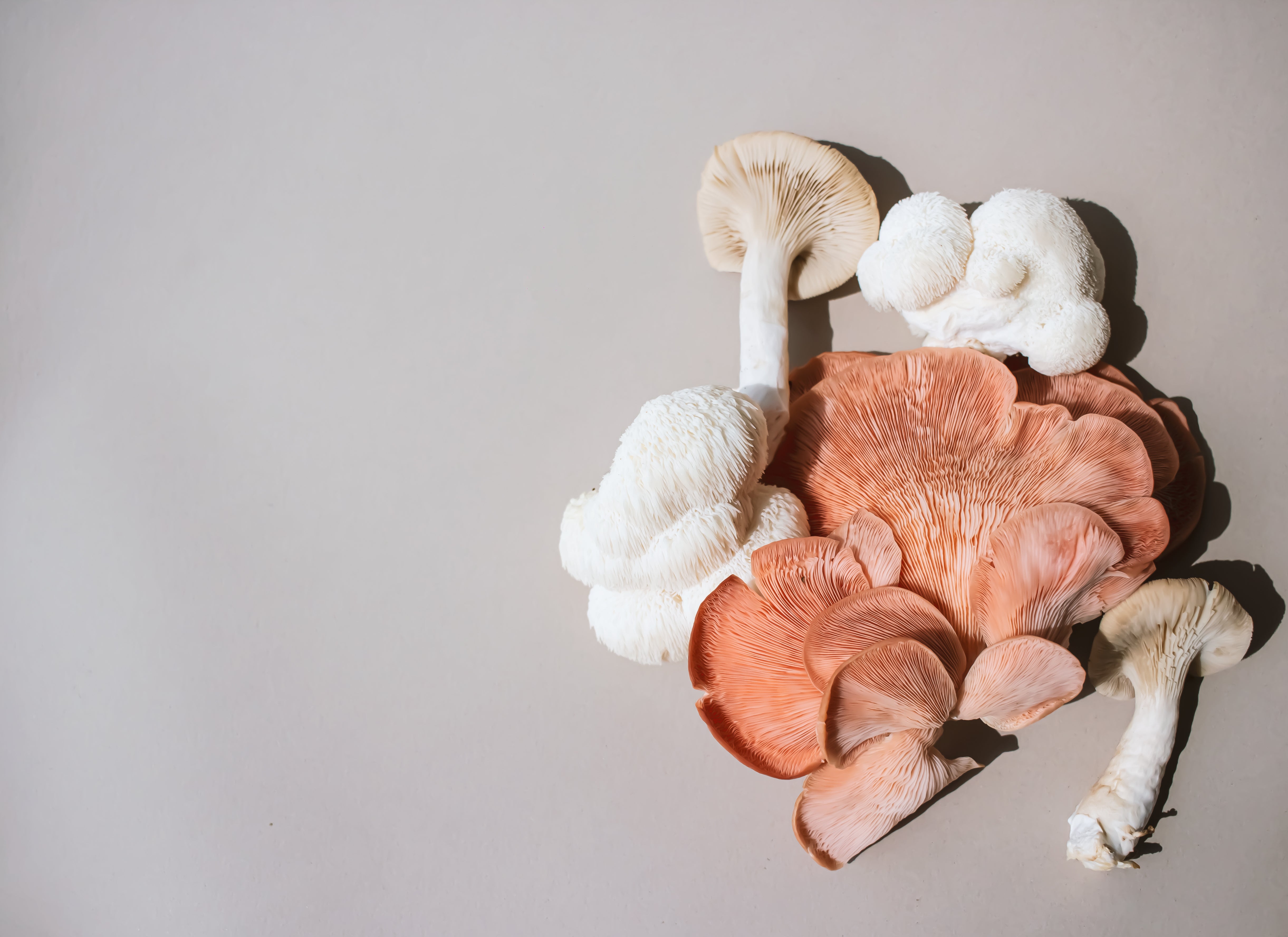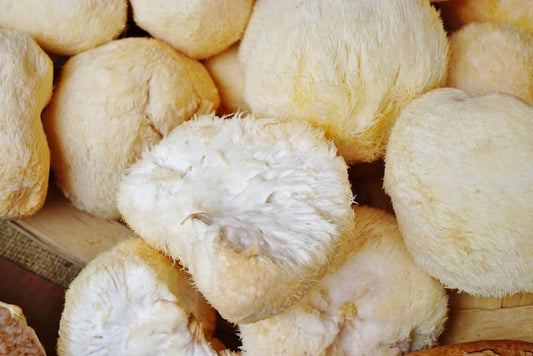Mushrooms are a rich, versatile food source. Their role as decomposers means that they break down and absorb the nutrients contained in organic materials and then reassemble those nutrients into fungal compounds with a wide range of bioactivity. This applies to culinary mushrooms (those commonly used in cooking) as well as functional mushrooms (those that have been found to have significant health-supporting activities in addition to the nutrition that they provide to support overall health). Just as there are some toxic plants species, there are some mushrooms that should not be consumed. However, many species of these fascinating fungi have been extensively researched and have been determined to be nutritious and safe for consumption.
So, do mushrooms have protein? It’s one of the more common questions we hear, and the answer is yes: Mushrooms do contain protein. For this reason, they are a welcome addition to a variety of diets (omnivore, vegetarian, vegan, keto, etc.). In addition, mushroom powder made from dried and ground whole foods can be a nutritional supplement. Here is a look at the diverse health benefits of mushrooms; some of them might surprise you.
What You Need to Know About Mushrooms
When the subject of mushrooms comes up, many people immediately think of those used in cooking. That’s because these culinary mushrooms are often enjoyed in family favorite dishes and gourmet recipes from the finest restaurants. However, particularly in eastern cultures, functional mushrooms are among the most revered natural health products. Functional mushrooms are usually dried and powdered or processed in other ways because their texture can be tough or woody and not conducive to consumption.
Mushrooms are considered a functional food, meaning they can provide added health benefits beyond simple nutrition. Their multitude of secondary metabolites and bioactive compounds provide various benefits. Here are five of them:
-
Mushrooms have protein
Though mushrooms are not plants, they are often grouped with plants and labeled as plant-based protein to distinguish them from animal sources. Mushroom proteins contain all nine essential amino acids (EAAs), in contrast to other plant-based proteins which typically are missing one or more EAAs. . Moreover, mushrooms have high branched-chain amino acids with very little fat, high fiber, and relatively low carbs, they are a healthy addition to your diet. The protein present in mushrooms contains all nine essential amino acids (EAAs), in contrast to most other plant-based protein options which are typically missing one or more EAAs. Moreover, mushrooms have a high branched-chain amino acid (BCAA) composition, which is usually only found in animal-based protein sources.
Like meat, mushroom protein is satisfying and nutritious. In a research study comparing protein-matched amounts of meat vs. mushrooms, those who consumed mushroom protein during breakfast expressed less hunger, greater fullness, and decreased prospective consumption during their next meal compared to those who consumed meat for breakfast. For these reasons, mushroom protein is an especially useful alternative for anyone following a strict vegetarian, vegan, or keto diet.
|
Protein Content of Some Popular Mushrooms (per 100g) |
|
|
Crimini (raw) |
2.50g |
|
Chanterelle (raw) |
1.48g |
|
Enoki (raw) |
2.00g |
|
Maitake (raw) |
2.00g |
|
Morel (raw) |
3.18g |
|
Oyster (raw) |
3.31g |
|
Portabella (raw) |
2.09g |
|
Shiitake (raw) |
2.10g |
|
White (raw) |
3.14g |
Source: nutritionvalue.org
-
Mushrooms are a good source of fiber
Mushrooms in the diet contribute to a healthy gut microbiome. The cell walls of mushrooms contain indigestible carbohydrates such as chitin and beta glucan compounds that provide prebiotic fiber. This fiber not only aids digestion but it can also support a healthy and diverse gut flora. Though indigestible to humans, the fiber is fermented by bacteria and other microorganisms in the gutwhere it nourishes them and supports their growth. Fermentation metabolites produced by probiotic organisms have been shown to provide important health benefits. Maintaining a healthy balance of beneficial bacteria can help to “crowd out” and displace populations of pathogenic bacteria while supporting many critical body functions, including immune, metabolic, and neurobehavioral health.
-
Mushrooms are rich in vitamins, minerals, and antioxidants
The human body requires many essential vitamins and minerals for optimal functioning. As a food or supplement, mushrooms are a rich source of B vitamins, macrominerals, trace minerals, (including copper, iron, magnesium, manganese, phosphorus, potassium, selenium, and zinc), and antioxidants. Regular consumption of mushrooms, or a mushroom supplement, can provide a source of these raw materials for coenzymes, strong muscles, immune support, and fluid balance. Their antioxidant content can support your body’s natural response to stress and promote healthy aging. ‡
-
Mushrooms have potent polysaccharides
The cell walls of mushrooms contain complex carbohydrates, including chitin, heteropolysaccharides, alphaglucans, and betaglucans. While also supporting one’s mood, and energy and providing antioxidant activity, betaglucans are considered to be nutritional fuel for the immune system.‡
-
Mushrooms have species-specific benefits
In addition to the features and benefits many mushrooms have in common, each species has different strengths due to its unique bioactive compounds. Some of the functional mushrooms and their characteristic benefits include:
- Lion’s mane: a nootropic that supports the brain and nervous system health‡
- Maitake: a culinary mushroom that promotes healthy digestion and metabolic health‡
- Reishi: a powerful adaptogen that helps the body handle stress‡
- Chaga: an unusual mushroom with a high antioxidant content that promotes healthy aging‡
- Cordyceps: a spindly mushroom that supports energy and endurance‡
- Turkey tail: a mushroom with superior immune support‡
Selecting a mushroom supplement based on its unique benefits can help you meet a variety of health and wellness goals.
Harnessing the Benefits of Mushrooms in Your Diet
Fresh mushrooms are nutritious, but they have a limited shelf life. When you consider the significant benefits of adding mushrooms to your diet, it makes sense to also consider the convenience of a mushroom powder supplement. Having a quality mushroom powder in your pantry gives you access to a potent and portable source of mushroom benefits.
You can choose a single-species mushroom powder supplement based on your personal wellness goals or try a blend that combines the power of several functional species. In either case, just a teaspoonful each day provides an adequate amount of beneficial bioactive compounds.
Whether you are looking for a healthy protein source or interested in the health benefits of this functional food, a mushroom powder supplement can provide the best of both worlds. Keep one in your cupboard for a protein-rich supplement that brings added health and wellness benefits.
‡These statements have not been evaluated by the Food and Drug Administration. Functional mushroom products are not intended to diagnose, treat, cure or prevent any disease.












